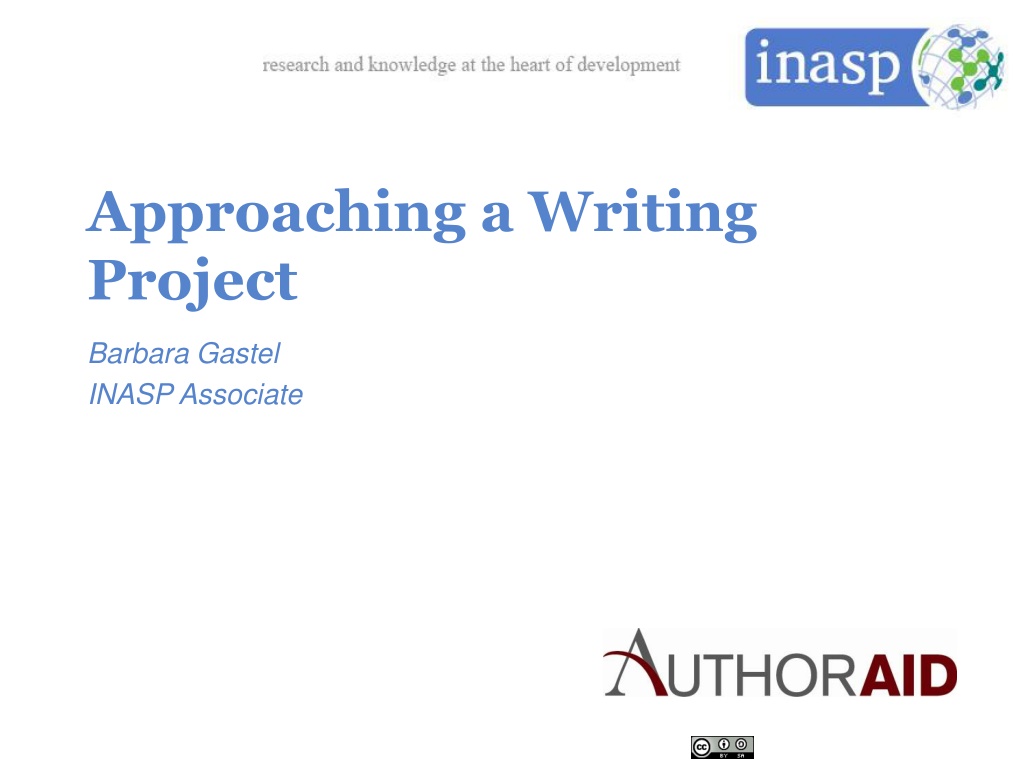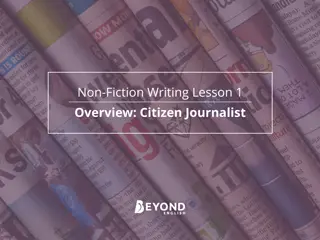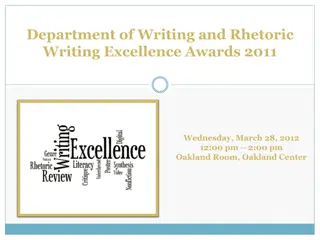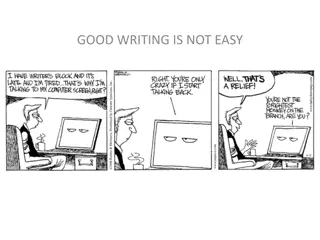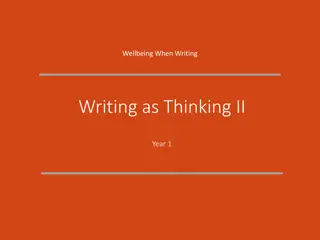Effective Strategies for Approaching a Writing Project
Establishing the right mindset, preparing thoroughly, and being open to feedback are essential steps when embarking on a writing project. Remember that simplicity and clarity are key in communication, and constructive criticism is meant to help you improve. Utilize style manuals, gather content efficiently, and engage in prewriting techniques to enhance your writing process.
Download Presentation

Please find below an Image/Link to download the presentation.
The content on the website is provided AS IS for your information and personal use only. It may not be sold, licensed, or shared on other websites without obtaining consent from the author. Download presentation by click this link. If you encounter any issues during the download, it is possible that the publisher has removed the file from their server.
E N D
Presentation Transcript
Approaching a Writing Project Barbara Gastel INASP Associate
Overview Establishing the mindset (attitude) Preparing to write Doing the writing Revising your work
Establishing the Mindset (Attitude) Remember that you are writing to communicate, not to impress. To communicate most effectively, writing about research should be simple and straightforward. Remember: Many readers may not be native users of the language in which you are writing. Also, almost every reader is busy.
Establishing the Mindset (Attitude) (cont) Realize that those reading your work want you to do well. Journal editors Peer reviewers Professors Their constructive criticism is intended to help you succeed.
Exercise Receiving suggestions to revise one s work can be upsetting. However, after reflection, we often realize that at least some of the suggestions are useful. Think of a time that an editor, peer reviewer, or professor suggested some revisions in your writing. How did you feel at first? How did you feel later, after you had opportunity to reflect on the suggestions? Please form a small group with one or two other people. Tell each other about the examples that you just thought of. See whether there are conclusions to draw. 10/09/2024 5
Preparing to Write Obtain and review instructions. Use published or accepted items as models. Perhaps get a style manual for example: The ACS (American Chemical Society) Style Guide AMA (American Medical Association) Manual of Style The Chicago Manual of Style The MLA (Modern Language Association) Style Manual and Guide to Scholarly Publishing Publication Manual of the American Psychological Association Scientific Style and Format
Preparing to Write (cont) While you are gathering content, write down ideas that occur to you. Do lots of prewriting for example: Stack papers in the order that you plan to cite them. List points you want to make. Perhaps make an outline. If you re having trouble formulating ideas, perhaps do something else for a while.
Exercise Think about how you like to prepare to write. Also think about how you might improve the way that you prepare to write. Then share your observations and thoughts with the other person or two in your small group. Be ready to share some comments with the full group. 10/09/2024 8
Doing the Writing Schedule specific times to write. Start with whatever part you find easiest. Don t interrupt your writing to search for small details. Realize that often in writing there is no one right way but rather a series of problems with more than one solution.
Exercise Think about your usual weekly schedule. Also consider what times of day you tend to function best. Then identify at least one time that would be good to set aside each week for writing. Compare your choice, and the reasons for it, with those of other members of your small group. 10/09/2024 10
Revising Your Work Note: Good writing is largely a matter of good revising. First revise your writing yourself. Then get feedback from others and revise more. Consider having an editor help you. Avoid the temptation to keep revising your writing forever.
Questions to Consider in Revising Does the piece of writing contain everything it should? Does it contain anything it shouldn t? Is all the information accurate? Is the content consistent throughout? Is everything logically organized? Is everything clearly worded?
Questions (cont) Does the level suit the intended readers? Is the writing concise? (Are points stated briefly, simply, and directly?) Are grammar, spelling, punctuation, and word use correct throughout? Are all figures and tables well designed? Does the manuscript comply with the instructions?
In Conclusion Questions and answers Wrap-up 10/09/2024 14
10/09/2024 15
This work is licensed under a Creative Commons Attribution ShareAlike 4.0 International licence. 10/09/2024 16
